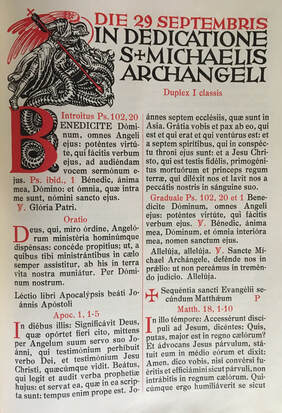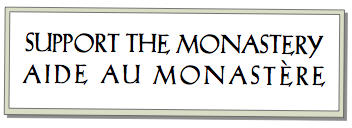
+ The section of Chapter 7 (“On Humility”) of the Holy Rule appointed for today is rather blunt: “We must be on our guard, then, against evil desires, for death lies close to the gate of delight; whence Scripture gives this command: Go not after thy lusts.” (cf. Eccl. 18:30). This imperative resonates in the Gospel we have sung at Matins (Mt 18:1-10) and shall do so again at Mass, in which our Lord teaches us that if something causes us to sin we are to severe ourselves from it—or indeed, as St Jerome taught in the third nocturn of Matins, from them if the occasion of sin be a person or a relationship.
Blunt language connotes blunt realities. We cannot compromise with sin or with the devil. We know in ourselves only too well the disastrous effects of so doing. We see those effects in the world from which we have sought sanctuary in the enclosure of the monastery. Even in parts of the Church in our day the disease of cancerous compromise between truth and falsehood, between good and evil, is all too evident.
But the truth, as taught by Christ in the Sacred Liturgy of His Church today, is clear: we must avoid occasions of sin as sin itself. This traditional maxim distils the teaching of the Gospel perfectly: it is better for us to leave behind “our lusts” than cling to them and “be cast into the fires of hell”.
For the fact is that the Christian today, as in any age, is at war: at war with the world, the flesh and the devil. Victory means nothing less than everlasting life in heaven. Loss means everlasting death in hell.
But in this war, in this constant effort to turn from our lusts, we have help. We have the supernatural means of grace, of the Sacrament of Confession, of the sustenance of the Blessed Eucharist, and of the intercession of the Communion of Saints. In particular, in this warfare we have the intercession of Saint Michael whose feast it is our joy to celebrate today.
Turn anew to Saint Michael and ask his intercession. It is not without significance that in recent months a number of bishops have ordered that the devotional prayer to him be prayed once again following Mass in their dioceses—we need his intercession and protection now more than ever. The prayer, expanding on the Alleluia verse of today’s Mass, implores him to “defend us in the day of battle so that we shall not perish on the day of judgement.” Let that prayer be on our lips as often as needs be, for it is surely better for us cry out to the Archangel Michael many times a day if needs be, than to “be cast into the fires of hell”. +
Blunt language connotes blunt realities. We cannot compromise with sin or with the devil. We know in ourselves only too well the disastrous effects of so doing. We see those effects in the world from which we have sought sanctuary in the enclosure of the monastery. Even in parts of the Church in our day the disease of cancerous compromise between truth and falsehood, between good and evil, is all too evident.
But the truth, as taught by Christ in the Sacred Liturgy of His Church today, is clear: we must avoid occasions of sin as sin itself. This traditional maxim distils the teaching of the Gospel perfectly: it is better for us to leave behind “our lusts” than cling to them and “be cast into the fires of hell”.
For the fact is that the Christian today, as in any age, is at war: at war with the world, the flesh and the devil. Victory means nothing less than everlasting life in heaven. Loss means everlasting death in hell.
But in this war, in this constant effort to turn from our lusts, we have help. We have the supernatural means of grace, of the Sacrament of Confession, of the sustenance of the Blessed Eucharist, and of the intercession of the Communion of Saints. In particular, in this warfare we have the intercession of Saint Michael whose feast it is our joy to celebrate today.
Turn anew to Saint Michael and ask his intercession. It is not without significance that in recent months a number of bishops have ordered that the devotional prayer to him be prayed once again following Mass in their dioceses—we need his intercession and protection now more than ever. The prayer, expanding on the Alleluia verse of today’s Mass, implores him to “defend us in the day of battle so that we shall not perish on the day of judgement.” Let that prayer be on our lips as often as needs be, for it is surely better for us cry out to the Archangel Michael many times a day if needs be, than to “be cast into the fires of hell”. +

 RSS Feed
RSS Feed


